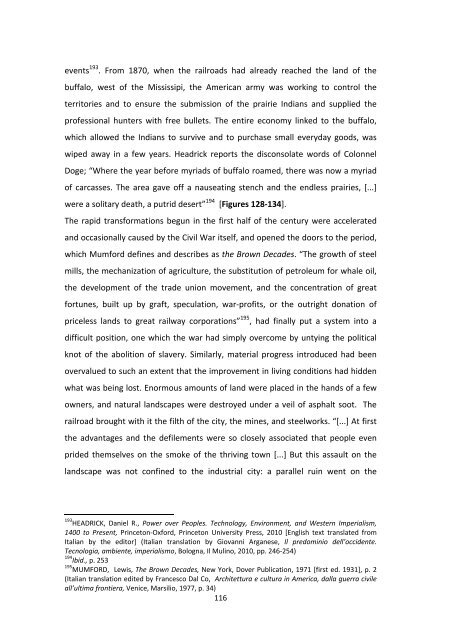building the american landscape - Univerza v Novi Gorici
building the american landscape - Univerza v Novi Gorici
building the american landscape - Univerza v Novi Gorici
Create successful ePaper yourself
Turn your PDF publications into a flip-book with our unique Google optimized e-Paper software.
events 193 . From 1870, when <strong>the</strong> railroads had already reached <strong>the</strong> land of <strong>the</strong><br />
buffalo, west of <strong>the</strong> Mississipi, <strong>the</strong> American army was working to control <strong>the</strong><br />
territories and to ensure <strong>the</strong> submission of <strong>the</strong> prairie Indians and supplied <strong>the</strong><br />
professional hunters with free bullets. The entire economy linked to <strong>the</strong> buffalo,<br />
which allowed <strong>the</strong> Indians to survive and to purchase small everyday goods, was<br />
wiped away in a few years. Headrick reports <strong>the</strong> disconsolate words of Colonnel<br />
Doge; “Where <strong>the</strong> year before myriads of buffalo roamed, <strong>the</strong>re was now a myriad<br />
of carcasses. The area gave off a nauseating stench and <strong>the</strong> endless prairies, [...]<br />
were a solitary death, a putrid desert” 194 [Figures 128‐134].<br />
The rapid transformations begun in <strong>the</strong> first half of <strong>the</strong> century were accelerated<br />
and occasionally caused by <strong>the</strong> Civil War itself, and opened <strong>the</strong> doors to <strong>the</strong> period,<br />
which Mumford defines and describes as <strong>the</strong> Brown Decades. “The growth of steel<br />
mills, <strong>the</strong> mechanization of agriculture, <strong>the</strong> substitution of petroleum for whale oil,<br />
<strong>the</strong> development of <strong>the</strong> trade union movement, and <strong>the</strong> concentration of great<br />
fortunes, built up by graft, speculation, war‐profits, or <strong>the</strong> outright donation of<br />
priceless lands to great railway corporations” 195 , had finally put a system into a<br />
difficult position, one which <strong>the</strong> war had simply overcome by untying <strong>the</strong> political<br />
knot of <strong>the</strong> abolition of slavery. Similarly, material progress introduced had been<br />
overvalued to such an extent that <strong>the</strong> improvement in living conditions had hidden<br />
what was being lost. Enormous amounts of land were placed in <strong>the</strong> hands of a few<br />
owners, and natural <strong>landscape</strong>s were destroyed under a veil of asphalt soot. The<br />
railroad brought with it <strong>the</strong> filth of <strong>the</strong> city, <strong>the</strong> mines, and steelworks. “[...] At first<br />
<strong>the</strong> advantages and <strong>the</strong> defilements were so closely associated that people even<br />
prided <strong>the</strong>mselves on <strong>the</strong> smoke of <strong>the</strong> thriving town [...] But this assault on <strong>the</strong><br />
<strong>landscape</strong> was not confined to <strong>the</strong> industrial city: a parallel ruin went on <strong>the</strong><br />
193 HEADRICK, Daniel R., Power over Peoples. Technology, Environment, and Western Imperialism,<br />
1400 to Present, Princeton‐Oxford, Princeton University Press, 2010 [English text translated from<br />
Italian by <strong>the</strong> editor] (Italian translation by Giovanni Arganese, Il predominio dell’occidente.<br />
Tecnologia, ambiente, imperialismo, Bologna, Il Mulino, 2010, pp. 246‐254)<br />
194 Ibid., p. 253<br />
195 MUMFORD, Lewis, The Brown Decades, New York, Dover Publication, 1971 [first ed. 1931], p. 2<br />
(Italian translation edited by Francesco Dal Co, Architettura e cultura in America, dalla guerra civile<br />
all’ultima frontiera, Venice, Marsilio, 1977, p. 34)<br />
116
















